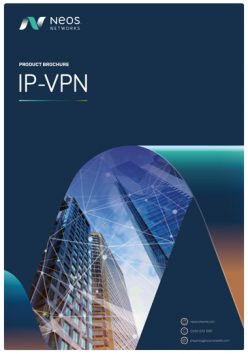What is IP-VPN?
For multi-site businesses that share functions and resources, Wide Area Network (WAN) technology can be hugely beneficial. Internet Protocol Virtual Private Network (IP-VPN) is one of the many types of WAN technology available.
You may have used a Virtual Private Network (VPN), a solution that lets users access a network remotely via a public internet connection, before – and IP-VPNs work in a similar way. Unlike VPNs, IP-VPNs use multiprotocol label switching (MPLS) technology to avoid connecting via public gateways, which in turn increases the security of your network.
Because they connect via public gateways, VPNs are at risk of something known as Distributed Denial of Service (DDoS) attacks that can take your network offline and decrease speeds. But by connecting with MPLS, your business’s internet usage gets prioritised while third-party (and potentially malicious) traffic is left to wait until the network is less busy.
What are the benefits of IP-VPN?
It can solve the key technology challenges, boost applications’ responsiveness, speed up transmissions and ease network congestion. IP-VPN offers numerous, business-changing benefits including:
Robust, tried-and-tested technology: IP-VPN’s use of Multiprotocol Label Switching (MPLS) means it provides resilient and efficient network traffic flow.
A completely secure network: This means enhanced protection from IT and OT cyber threats that could cause costly downtime. This is particularly important for businesses that support critical infrastructure – like those in the energy and utilities sectors.
Total control: You can tweak and improve application performance; prioritise data traffic according to business need; and run historical reports to analyse bandwidth, statuses and usage statistics.
Superior performance: IP-VPN guarantees bandwidth for demanding applications like HD video-conferencing, and offers low latency and packet loss, meaning consistently high quality of service for you and your end-customers.
VPN usage statistics
As the number of internet users grows exponentially (standing at 4.1 billion users, according to January 2020 research from Best VPN), so do hacking opportunities. The same Best VPN study found that 82% of businesses have employees who do not follow data privacy policies. This underlines the need for organisations to implement strong security measures.
Many individual and business users, though, are more vigilant. According to Statista, from 2017 to 2018, the number of VPN users grew by 165%. The Covid-19 pandemic meant more people were using the internet at home, triggering a rapid increase in VPN usage. Atlas VPN found that from 8 to 22 March 2020, numbers of users rose by 124%. Statista project that the VPN market will be worth almost £76 billion by 2027, up from £25 billion in 2019.
With the rise of VPNs though, hackers will be striving ever harder to find ways through them. The need for a higher level of security then, is evident, encouraging more and more organisations to turn to IP-VPNs.










